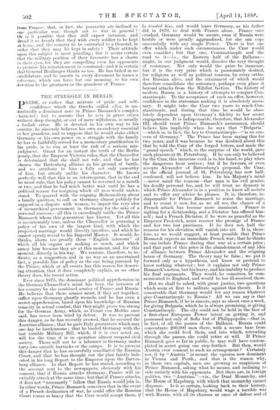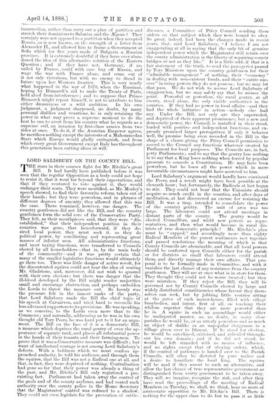THE STRUGGLE IN BERLIN.
PRIDE, or rather that mixture of pride and self- confidence which the Greeks called u,Spic, is un- doubtedly a dominant note in Prince Bismarck's complex character ; but to assume that he acts in grave crises without deep thought, or out of mere wilfulness, is usually a foolish error. He is devoted in his own way to his country, he sincerely believes his own ascendency essential to her grandeur, and to suppose that he would stake either Germany or his own power on a struggle with the family he has so faithfully served for a momentary gratification to his pride, is to run at least the risk of a serious mis- judgment. Grant for an instant the truth of the Berlin gossip, that the Empress Victoria rules, that the Chancellor is determined that she shall not rule, and that he has chosen the Battenberg alliance as his ground of battle, and we attribute to him a folly not only unworthy of him, but utterly unlike his character. He knows perfectly well that this is an interregnum, that in the end he must rule, that his policy cannot be reversed in a month or two, and that he had much better wait until he has a political reason for resigning which all men would under- stand. To quarrel with the reigning Hohenzollern about a family question, to call on Germany almost publicly for support in a dispute with women, to impair the very idea of monarchical government in Germany for the sake of a personal success,—all this is exceedingly unlike the Prince Bismarck whom this generation has known. Yet all this is incontestably true, unless the Chancellor is pursuing a policy of his own of the largest kind, with which the projected marriage would directly interfere, and which he cannot openly reveal to his Imperial Master. It would, he thinks, alarm too greatly those " English interests" of which all his organs are making so much, and which annoy him because they are at this moment, and for this moment, directly in his way. We venture, therefore, to in- dicate, as a suggestion, and in no way as an ascertained fact, a possible line of policy as the one being pursued by the Prince, which at all events has this reason for deserv- ing attention, that it does completely explain, as no other theory does, his recent action.
Ever since 1875, the dominant political apprehension in the German Chancellor's mind has been the invasion of his country by the combined armies of France and Russia. He believes that these armies must, if they act together, inflict upon Germany ghastly wounds, and he has even a secret apprehension, based upon his knowledge of Russian tenacity in actual combat, that they might prove too strong for the German Army, which, as Count von Moltke once said, has never been tried by defeat. It was to prevent this danger, as he has recently avowed, that he secured the Austrian alliance ; that he gave Italy guarantees which may one day be burdensome ; that he loaded Germany with the last terrible Military Bill, which, if it is ever acted on, will for the time it is in operation almost suspend civil society. There will not be a labourer in Germany under forty-two outside barracks or the camps. It is to prevent this danger that he has so carefully conciliated the Russian Court, and that he has thought out the plan faintly indi- cated in his long Report to the Emperor upon the Batten- berg alliance. In that Report he has stated, according to the account sent to the newspapers, obviously with his consent, that if Russia attacks Germany, France will in- evitably attack at the same time; but that if France attacks, it does not " necessarily " follow that Russia would join in. In other words, Prince Bismarck conceives that in the event of a French declaration of war, he could offer the Russian Court terms so heavy that the Czar would accept them, if he trusted him, and would leave Germany, as his father did in 1870, to deal with France alone. France once crushed, Germany would be secure, even if Russia were hostile or were greatly aggrandised, for she can cope successfully with any single Power. There is but one offer which under such circumstances the Czar would even consider ; but that one, Constantinople and the road to it—i.e., the Eastern half of the Balkans— might, in our judgment would, dissolve the very thought of resistance. Not only would the prize be immense, but it is the very prize which is passionately desired, for religious as well as political reasons, by every ortho- dox Russian alive, and the attainment of which would therefore consolidate the autocracy, perhaps even place it beyond attacks from the Nihilist faction. The history of modern Russia is a history of attempts to conquer Con- stantinople. To the acceptance of such an offer, however, confidence in the statesman making it is absolutely neces- sary. It might take the Czar two years to reach Con- stantinople, and during that time he would be abso- lutely dependent upon Germany's fidelity to her secret engagements. It is indispensable, therefore, that Alexander III. should trust Prince Bismarck's assurances, should believe him implicitly when he says that "Bulgaria" —which is, in fact, the key to Constantinople—" is no con- cern of Germany." The Prince has been saying this for two years, and it was because he was doubted about this that he told the Czar of the forged letters, and made the " grand speech " which, to the surprise of the world, gave such pleasure at St. Petersburg. If he can only be believed by the Czar, this immense card is in his hand, to play when the dangerous hour arrives ; but if he favours, or even accepts Alexander of Battenberg's proposal, the Czar, as the official journal of St. Petersburg has now half- confessed, will not believe him. In his Majesty's mind —never mind the reasons—that man is his evil genius, his deadly personal foe, and he will trust no dynasty in which Prince Alexander is in a position to know all secrets and to offer any advice he pleases. It is, therefore, in- dispensable for Prince Bismarck to resist the marriage, and to resist it now, for, as we all see, the chance of a French attack has become more imminent. France is sighing for a dictatorship, and a Dictator has offered him- self ; and a French Dictator, if he were as peaceful as the Emperor Frederick, must recover the prestige of France and her two lost provinces. If he does not, half the reasons for his elevation will vanish into air. It is, there- fore, as we would suggest, at least possible that Prince Bismarck expects an immediate French war; that he thinks he can isolate France during that war at a certain price ; and that part of this price is the abandonment of any idea of alliance between Prince Alexander and the reigning house of Germany. The theory may be false ; we put it forward only as a hypothesis, and know or pretend to know nothing whatever ; but it explains not only Prince Bismarck's action, but his hurry, and his inability to produce his final arguments. They would, he conceives, be com- municated to England, and would be too ill-received there.
But we shall be asked, with great justice, two questions which seem at first to militate against this theory. Is it conceivable that Germany would for any reason whatever give Constantinople to Russia ? All we can say is that Prince Bismarck, if he is sincere, says so about once a week, for giving Bulgaria, which he is always promising, is giving Constantinople. The city could not be held in the face of a first-class European Power intent on getting it, and possessed not only of Sofia but of Philippopolis,—that is, in fact, of all the passes of the Balkans. Russia could concentrate 200,000 men there, with a secure base from which she could feed them, and into which, retreating through the passes, she could retire at will. If Prince Bismarck goes so far in public, he may well have contem- plated in secret going one step further. But then, would Austria ever consent to such an arrangement ? Certainly not, if by " Austria" is meant the opinion now dominant in Vienna and Pesth ; and that is the reason why, in those two capitals, men are growing so suspicious of Prince Bismarck, asking what he means, and inclining to side entirely with his opponents. But there are, in foreign politics, two " Austria,s, —viz., the Dual Monarchy, and the House of Hapsburg, with which that monarchy cannot dispense. Is it so certain, looking back to their history, that the House of Hapsburg would wage a terrible war with Russia. with all its chances at once of defeat and of insurrection, rather than carry out a plan of partition and stretch their dominions to Salonica, and the Agean ? They certainly were not opposed to a partition when they accepted Bosnia, as is now known, on the strength of a letter from Alexander II., and allowed him to frame a Government at Sofia which for five years made of Bulgaria a Russian province. It is extremely doubtful if they have ever aban- doned the idea of this alternative solution of the Eastern Question ; and if they have not, Germany, if as- sailed by France, could with ease buy off Russia, and wage the war with France alone, and come out of it not only victorious, but with no enemy to dread in future upon her Western frontier. This is very nearly what happened in the war of 1870, when the Russians, hoping by Bismarck's aid to undo the Treaty of Paris, held aloof from interference ; and to suppose that Prince Bismarck might repeat himself, is not to attribute to him either dreaminess or a wild ambition. In his own judgment, a judgment sharpened, no doubt, by many personal dislikes and vexations, he is only retaining the power in what may prove a supreme moment to do the best he can to avert from his country what he regards as a supreme evil, an invasion by first-class armies from two sides at once. To do it, if the Austrian Emperor agrees, he sacrifices nothing except the interests of a Mahommedan State which Europe would gladly extinguish, and from which every great Government except Italy has throughout this generation been cutting slices at will.



































 Previous page
Previous page